Photo: Martin Legalize
MAR Fund thanks all our partners whose unwavering support and collaboration have been key in achieving our collective objectives
Photo: Albatros Media Foundation
- Between March 12 and 15, KfW conducted a project monitoring mission in Quintana Roo to evaluate the progress of Phase III implementation, identify challenges and risks, and engage with stakeholders in the region. Meetings were held with CONANP personnel representing the four eligible coastal marine protected areas (CMPAs) from the first call, and with IBANQROO for the CMPAs of Cozumel.
- Thanks to the support of the German Cooperation through the KfW, 12 projects have been approved for the first call for proposals.
Guatemala
Objective: To consolidate a participatory national and regional habitat and biodiversity conservation strategy that ensures the sustainability of fisheries, the resilience of coral reef ecosystems, and the governance of Cayman Crown.
Project Progress:
- The economic valuation of the lobster fishery at Punta de Manabique Wildlife Refuge revealed that the average value of the resource per fishing family is US$314 per month, which is below the cost of the basic food basket.
- A workshop was held to train 16 participants in the use of the SMART app, focusing on citizen science, patrolling, surveillance, and landing monitoring.
- FUNDAECO attended the inaugural meeting of the Inter-Institutional Commission for Hydro-Oceanographic Research in 2024. The commission proposed conducting a hydrographic survey of the newly discovered reef (Coronita) adjacent to the Cayman Crown no-take zone.
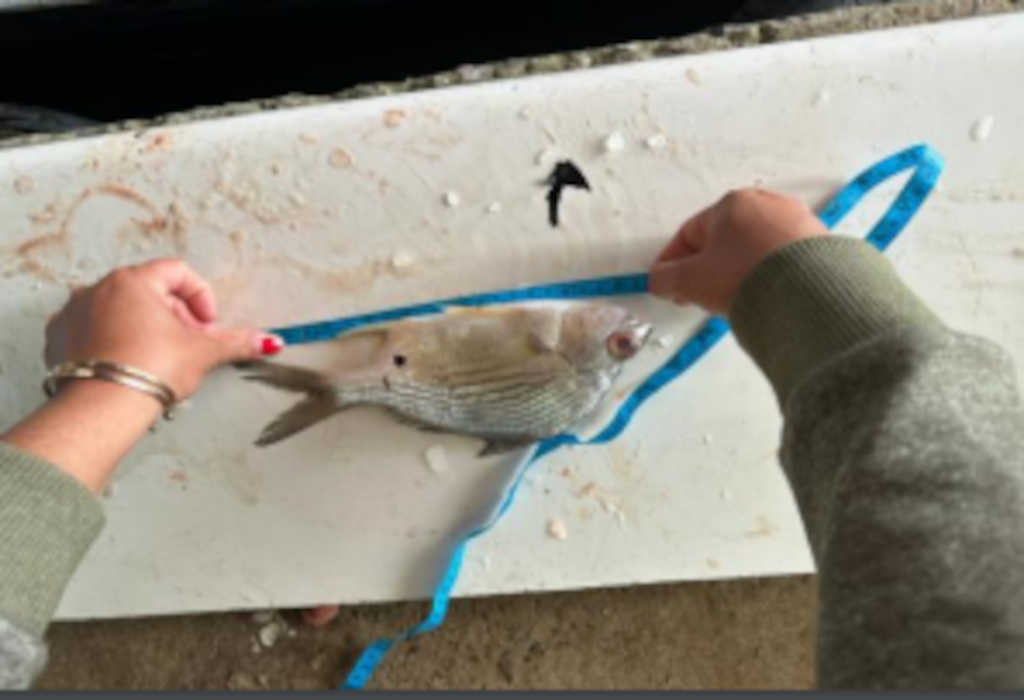
Photo: FUNDAECO
Guatemala
Objective: Conserve and restore 254 ha of tropical forest and mangrove ecosystem in communities of the Sarstún River watershed, promoting sustainable strategies with the environment, contributing to the resilience of the ecosystems of the Mesoamerican Reef System, through community governance mechanisms.
Project Progress:
- Five applications from the San Juan community were submitted to CONAP to qualify for forest incentives, covering a total of 110.6 ha of forest for conservation. The estimated total economic benefit to the community over 10 years is US$264,010.
- The San Juan community credit committee was provided with essential office equipment, including a computer, printer, desk, and secretarial chair to facilitate the loan management process.
- A composting latrine was built near the bakery for the Barra Sarstún Women’s Committee. A corn nixtamal mill was also purchased for their use.
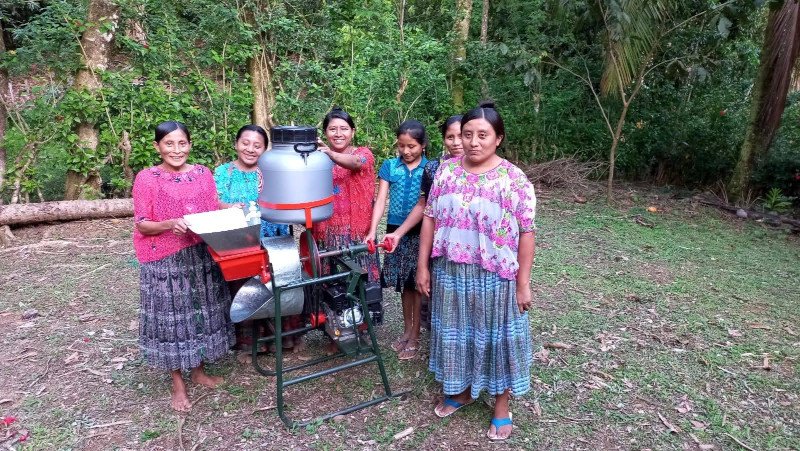
Corn nixtamal mill provided to the Barra Sarstún Women’s Committee.
Photo: EcoLogic
Guatemala
Objective: By the end of 2025, appropriate governance practices for natural resources, local ventures, and resilience strategies to climate change ensure the protection of 255.85 ha of tropical forest in the RSMUA and an improvement in the living conditions of the community members.
Project Progress:
- Nine applications from the communities of Barra Sarstún (4) and Tapon Creek (5) were submitted to the State Territorial Reserve Areas Control Office (OCRET, in Spanish) to qualify for forest incentives, covering 173.83 ha. The estimated economic benefit to these communities over a 10-year period is US$441,450.
- In the communities of Blue Creek and Sarstun Creek, 12 ha of land previously degraded by intensive agriculture have been designated for agroforestry. Selected plants include Inga edulis, plantain, persian lime, and cardamom.
- In January 2024, the Local Community Development Committee of Barra Sarstún officially opened lodging services in the Sarstun River region.
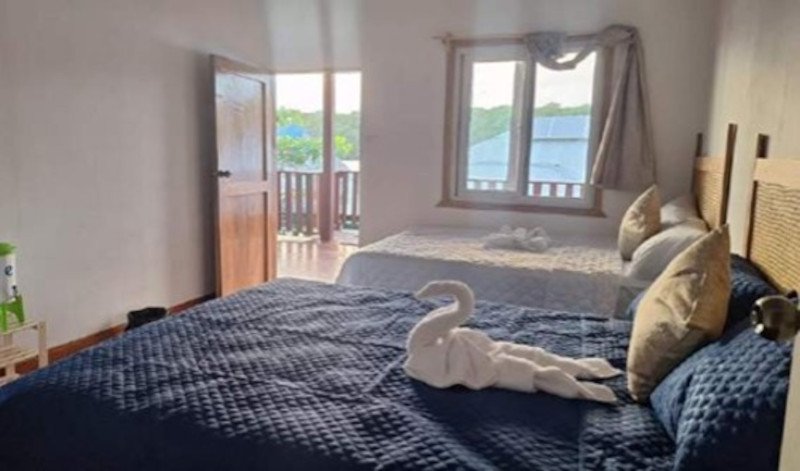
Photo: EcoLogic
Guatemala
Objective: By the end of 2027, natural resource governance practices, environmental sanitation, local entrepreneurship, and climate change resilience strategies ensure the protection of 415 ha of tropical forest in the Rio Sarstún Multiple Use Area (RSMUA) and an improvement in the living conditions of the community members.
Guatemala
Objective: By 2025, the sustainability of conservation efforts of the beach and forest system of the Río Sarstún Multiple Use Area has been strengthened through the sustainable and inclusive development of the Reserve’s ecotourism site Guaira-Cocolí Coastal Natural Area.
Mexico
Objective: By 2025, the capacities of 20 women and youth have been strengthened in financial, digital, and ocean literacy to develop projects for marine conservation and sustainable fisheries in federal Protected Natural Areas (PNAs) in the Mexican Caribbean.
MAR Fund collaborated with WWF and other partners, to host the Run for the Reef as a component of Reef Week 2024, commemorated in Belize from March 9 – 16, 2024. The event saw the participation of 122 individuals participating in either the 8-mile race or 2-mile run/walk.
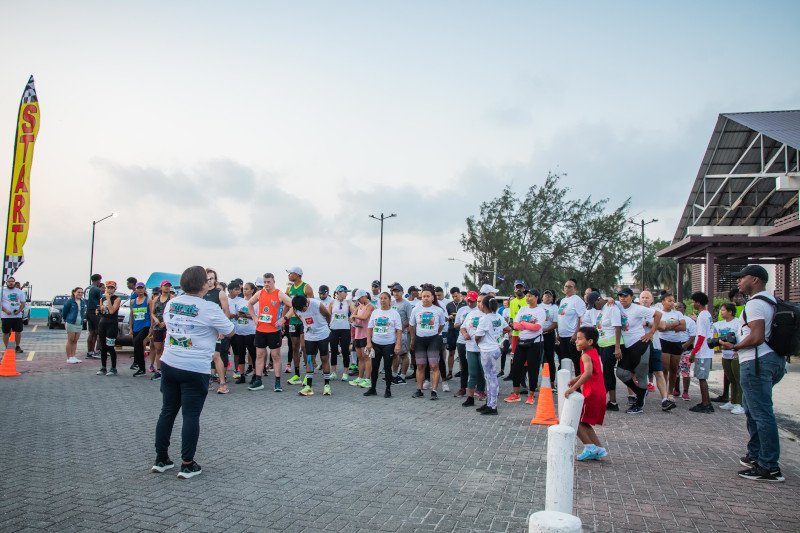
Photo: WWF
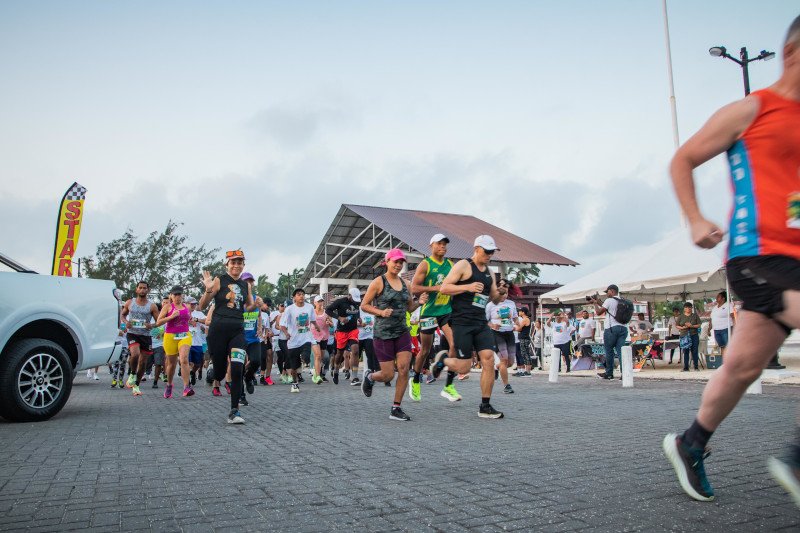
Photo: WWF
Photo: Roatán Marine Park
Honduras – Belize
Objective: Identify sites where spawning aggregations of deep-water fishes occurs, along with the timing of these events using standardized methods. Age validation will determine the age-structure of the spawning populations, and genetic analysis will determine how gene flow and larval transport affect distribution.
Project Progress:
- Preliminary results indicate that, for Silk snapper, there is genetic connectivity between Belize and Honduras, with no genetic variation found among the countries.
- For Cardinal Snapper, two different populations were detected between Lighthouse Reef and Southern Belize with the presence of a possible barrier to gene flow. Between Southern Belize and Honduras no genetic variation was observed, showing population connectivity.
- On January 10, 2024, a webinar presented an ecological risk assessment for 10 key fish species, including jacks, snappers, and groupers, revealing overexploitation and the need for improved management and protection strategies. The event was attended by 55 participants.
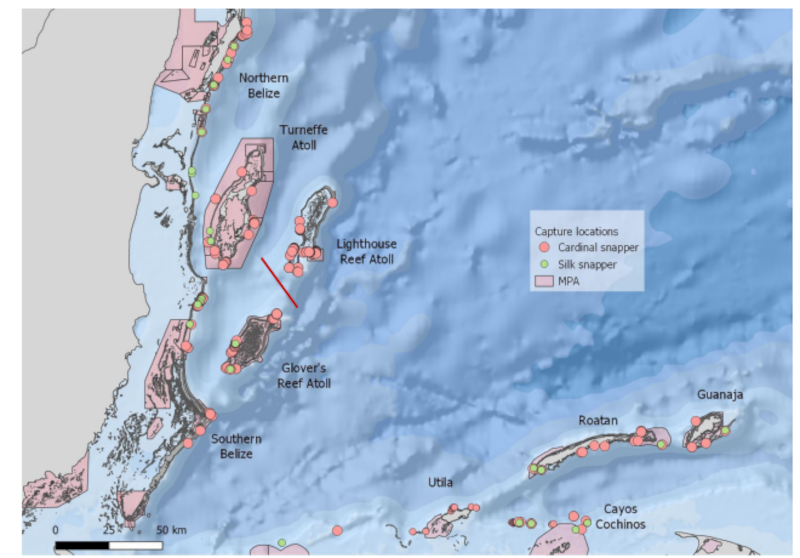
Photo: MarAlliance
Belize
Objective: Characterization of FSA of Cayman Crown and provide initial management for Cayman Crown MPA in Belize.
Project Progress:
- TIDE hosted the TRIGOH Annual General Assembly Meeting on February 28, with 20 participants from Belize, Guatemala, and Honduras. Highlights included electing TIDE as President of the new Board of Directors and scheduling three national fisher forums for early 2024.
- Enforcement patrols were conducted at Sapodilla Cayes Marine Reserve, in collaboration with the Belize Coast Guard. Between January and March, 82 patrols were conducted reporting six infractions, five fishing gear confiscated, and two arrests for illegal shark fishing in Cayman Crown
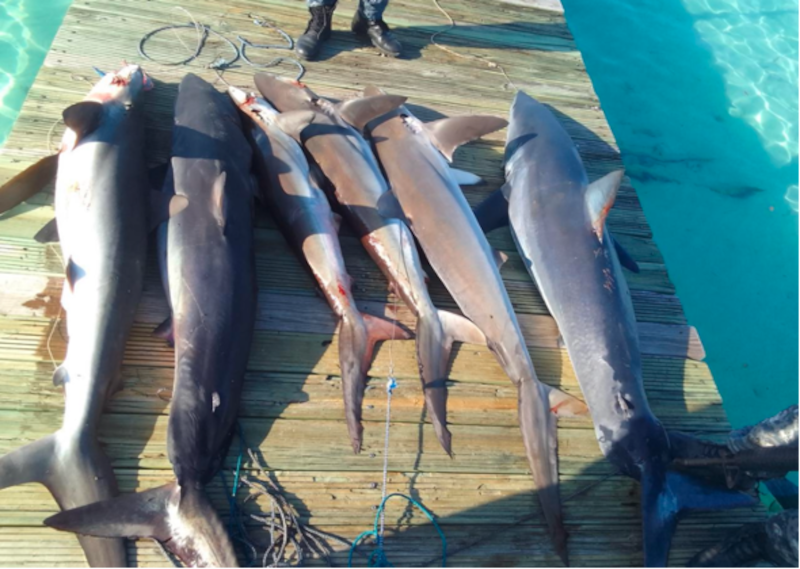
Photo: TIDE
- TIDE trained four community researchers in Fish Laser Sizing in preparation for the FSA characterization and monitoring expeditions. Twenty-eigh commercial finfish were observed, including grouper, snapper, and jack species. In February, a hydrophone and temperature logger were deployed as part of a pilot test.
Belize
Objective: Promote the recovery of fisheries in the Mesoamerican Reef region, by strengthening the network of protected spawning aggregation sites of commercial fish, as critical areas in the life cycle of these species. Gladden Spit Silk Cayes Marine Reserve (GSSCMR) has been identified as a key sentinel site in the network of fish spawning aggregation in the Mesoamerican Reef region.
Project Progress:
- FSA monitoring took place from January to April at Gladden Spit Silk Cayes Marine Reserve (GSSCMR). Results are currently being analyzed.
- Final preparations for regional training workshops on standard techniques and protocols for monitoring fish spawning aggregation have been conducted, securing the venue, and instructors, formalizing the agenda, and confirming participants.
Guatemala
Objective: Provide management and zoning recommendations for the Cayman Crown and initial management funding for Cayman Crown with stakeholders in Guatemala.
Project Progress:
- Developed an economic diversification strategy in three communities of the Punta Manabique Wildlife Refuge and prioritized three livelihood activities to develop in the communities. The livelihood activities prioritized include for Quetzalito, the production of vegetables, the sale of school supplies, and a corn mill; in Estero Lagarto, tourism (hotel and restaurant), the sale of ice and dairy products, fruits, and vegetables; and in San Francisco del Mar, sale of basic staple products and ice, and raising chickens and/or pigs.
- This strategy was presented during the trinational fishing forum coordinated by TRIGOH on April 23, 2024. Participants included 47 community members, the Fishermen’s Association of Santo Tomás de Castilla, and representatives of Manjúa fishermen from Puerto Barrios.
Cayman Crown
Objective: Generate a detailed map of the Cayman Crown area, conduct ecological characterization of coral reef and megafauna, and monitor reef health near or at sentinel sites to communicate results in report cards, Eco Audits, and social media.
Project Progress:
- In March, an expedition to Cayman Crown assessed bleaching impacts, ground truthing reef areas, and retrieved hydrophone data for acoustic noise mapping.
- A regional partner meeting gathered 50 participants from MAR countries to discuss conservation strategies for the 2024 MAR Health Report Card.
- In April, at the UN Ocean Decade Conference in Barcelona, HRI presented on long-term reef monitoring in the MAR, highlighting successes in the Cayman Crown area.
- Premieres and media tours were held for the Spanish version of the Nature PBS documentary “Treasure of the Caribbean” in Tegucigalpa, Roatan, and Utila, Honduras. This aims to foster discussions on fish spawning aggregation conservation and collaborative efforts to combat illegal fishing activities.
Photo: Gabriela Ochoa/Fundación Albatros
Project Progress:
From April 15 to 18, partners from the Mexican Carbon Program (PMC), the Center for Research and Advanced Studies (CINVESTAV) of the Instituto Politécnico Nacional (IPN), the Foundation for Ecological Development and Ecological Development and Conservation (FUNDAECO), the Center for Marine Studies (CEM), and the Smithsonian Institution (SI) met in Omoa, Cortes, Honduras. The purpose of the meeting was to present restoration and monitoring results, discuss project lessons learned and challenges, coordinate the preparation of two scientific publications, identify funding needs, and share inputs for the proposal for a second phase of a regional mangrove restoration project.
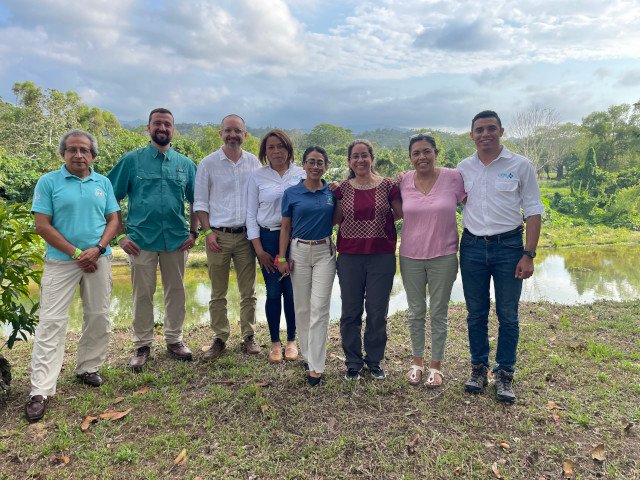
Photo: MAR Fund
MAR Fund supported the Third Quintana Roo Wetlands Colloquium, which featured 27 speakers. The first keynote presentation entitled “The Importance of Wetlands for Ecosystem Health” was given by Jorge Herrera (CINVESTAV). Nine organizations participated in the International Experience Exchange session, where MAR Fund’s partners FUNDAECO and Smithsonian Institution presented mangrove restoration and monitoring results. A total of 133 people attended the colloquium (59 women and 74 men).
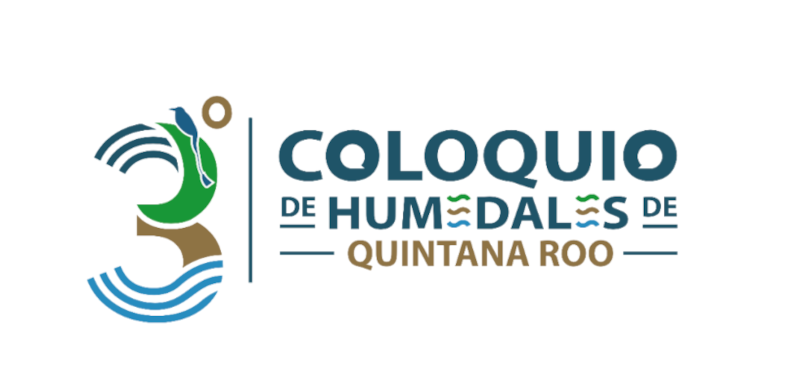
Photo: CONAGUA
Objective: Implement cost-effective insurance to cover hurricane risk to the MAR and enhance resilience of the local beneficiaries who depend on the reef for their livelihoods, food security, and protection from coastal hazards.
Project Progress:
- The programme continues operating in the MAR, in the 11 sites covered for the term June 2023-May 2024. MAR Fund continues working with WTW in designing the insurance coverage for the 2024/2025 policy year.
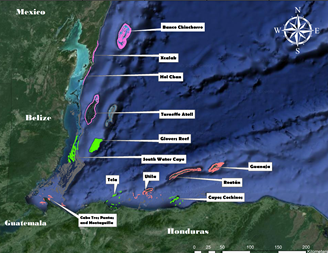
Objective: Enhance institutional capacity to mitigate the impacts of hurricanes in coral reefs in the MAR.
Project Progress:
- In January, the Wildlife Conservation Society (WCS) held two Rapid Response and Emergency Reef Restoration Courses. A total of 19 participants were trained as reef responders for both sites of the southern side of Belize.
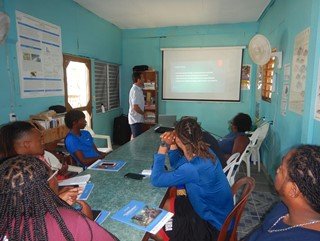
Photo: Andrés Fletes
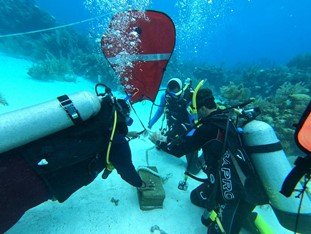
Photo: Andrés Fletes
- In March, the workshop “Training in Funding Opportunities for Reef Restoration and Emergency Response” aimed to train partners on the emergency fund and the insurance payout distribution process, as well as the requirements to apply. A total of 42 participants attended, including governmental representatives, as well as coral reef experts, reef responders, and technicians from various NGOs and government institutions from the four MAR countries.
- A Reef Response Coordinating Committee has been formed to oversee Glover’s Reef Marine Reserve and South Water Caye Marine Reserve.
Objective: To provide immediate and timely financing to reef sites that have been impacted by natural disasters or anthropogenic activities.
Project Progress:
- In March and April of 2024, the National Commission of Protected Natural Areas (CONANP), in collaboration with Natural Spaces and Sustainable Development A.C. (ENDESU), implemented monitoring and maintenance campaigns of the in situ coral nurseries. These campaigns focused on evaluating the survival rates of the rescued pillar coral colonies. Additionally, they conducted thorough assessments of water quality, measured various physicochemical parameters, and monitored for signs of coral bleaching.
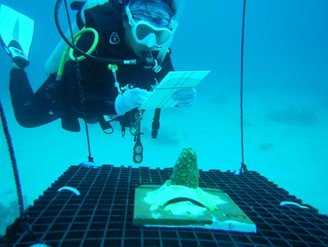
Photo: CONANP
Mexico
Objective: By the end of 2023, in synergy with regional and local stakeholders, the resilience of the reef is increased through novel techniques of massive coral repopulation, the efficiency of the restoration is evaluated through systematic monitoring and the organic vinculation of the local community is strengthened under a comprehensive strategy of regenerative tourism to ensure the sustainability of the project.
Project Progress:
- AGGRA monitoring was conducted at five sites and according to the Reef Health Index, two sites were classified as “good”, two as “fair” and one as “poor”.
- Thanks to the maintenance campaigns in Akumal, the survival rate of the fragments in the nurseries was 85% and the survival rate of the planted fragments was 50%.
- CEA created a “wish list” of equipment and materials needed for the activities in an online store and received packages from various donors.
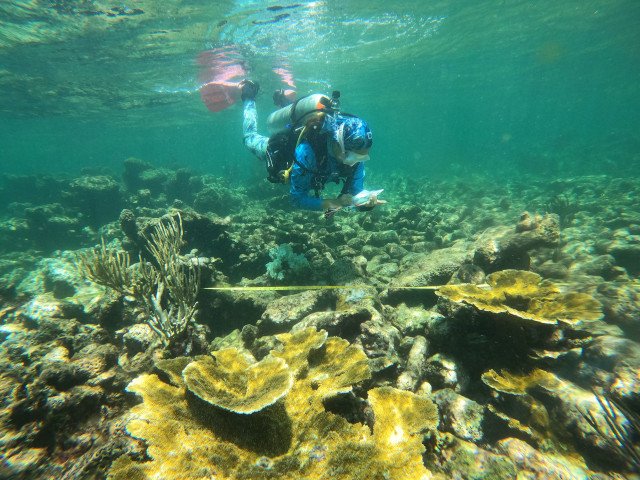
Photo: CEA
Mexico
Objective: To increase the adaptation and resilience of coral reefs and coastal communities in the Mesoamerican Reef through rehabilitation of reef sites and associated fauna.
Project Progress:
- A total of 13,916 corals were outplanted across Cancun, Cozumel, Puerto Morelos, Mayakobá, Punta Maroma, Tulum, Mahahual and Xcalak; totaling 84,697 since 2014.
- Pre and post project evaluations were developed to measure increase in coral size classes and fish density. The increase in size classes above 20cm was 49% and above 30cm was 37% of the outplanted colonies.
- Two educational hubs were established, one in Cozumel and one in Chetumal.
- Oceanus developed the first pilot course for their new educational program “Underwater Explorers” to share basic coral reef concepts, coral’s importance, their restoration program and techniques used.
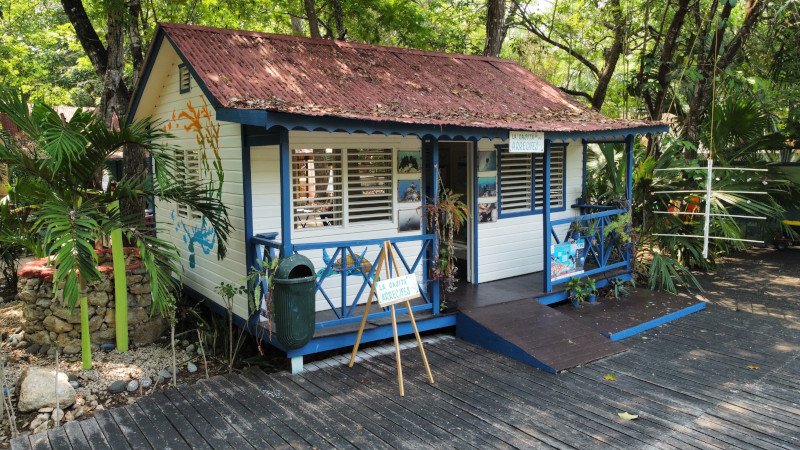
Photo: Oceanus
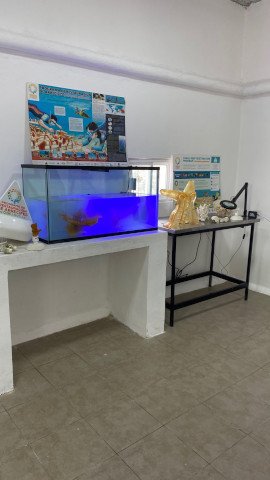
Photo: Oceanus
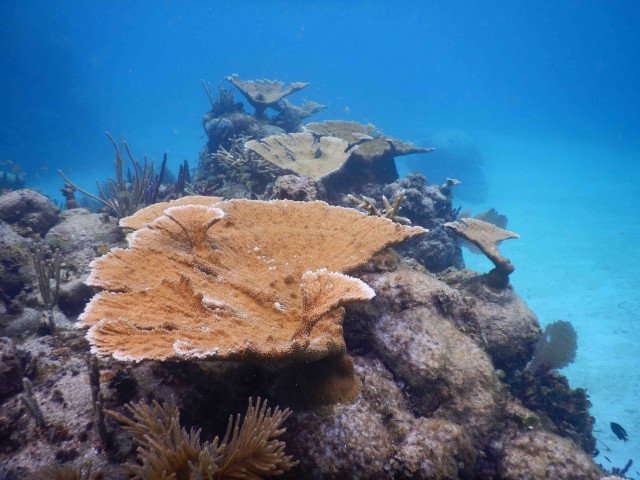
Photo: Oceanus
Photo: Blue Ventures
The Belize Marine Fund (BMF) supports projects through two programmatic windows 1) the Targeted Grants Program and 2) the Small Grants Program. The projects supported by these programs have been guided by those priority areas of focus established in the BMF’s Strategic Plan and in consultation with the BMF Steering Committee.
Objective: To raise national and international awareness, through an original documentary film, of the efforts being undertaken by women leaders from various walks of life to preserve Belize’s Barrier Reef Reserve System and to inspire both local and international audiences to take action to support these efforts.
Project Progress:
- The film’s Director’s Cut was completed in March 2024. A link to the film was shared for private viewing. According to the film developers, it is expected that the final version of the film will be available in July 2024.
Objective:To implement the Branding, Marketing and Communications Strategy for Belize’s Barrier Reef Reserve System World Heritage Site by carrying out activities that contribute to the effective communication and marketing of the Belize Barrier Reef Reserve System—raising awareness in the general Belizean populace and highlighting its uniqueness and value through social and traditional media as well as engaging international tourists in promoting Belize’s WHS.
Project Progress:
- CZMAI hosted the first meeting of its Project Steering Committee on January 23rd, 2024. This meeting provided an opportunity for the convening of key project partners and stakeholders providing representation on the Committee. The organization also finalized the terms of reference for the commissioning of the consultancy to develop the WHS website.
- Additionally, CZMAI in collaboration with the Ministry of Blue Economy updated the BBRRS-WHS social media page to promote Reef Week 2024 commemorated in Belize from March 9 – 16, 2024.
Objective: To re-establish the Gales Point (Manatee) Wildlife Sanctuary through a revised co-management agreement between the local community and the Government of Belize, update a conservation management plan for the area, and train the community in alternate livelihood opportunities.
Project Progress:
- In collaboration with the Gales Point Village Council and previous Sanctuary Board members, CMARI facilitated the election of a new five-member Board for the Gales Point Manatee Wildlife Sanctuary. They also reinstated a Steering Committee to oversee the sanctuary’s management plan and provide technical guidance.
- CMARI also helped the Sanctuary Board regain co-management rights and renew its agreement with Belize’s Ministry of Sustainable Development.
- A workshop with 54 stakeholders for developing a revised sanctuary management plan was facilitated.
- Additionally, during March, manatee tagging and health assessments were executed, assessing 11 animals including one recapture. They also refurbished a patrol boat which now awaits canopy installation.
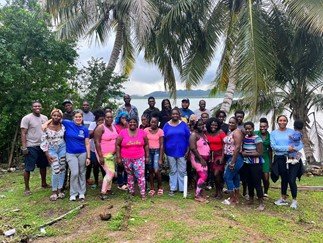
Photo: CMARI
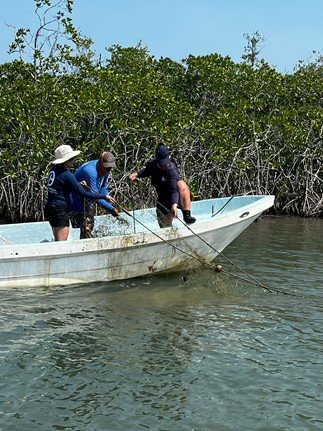
Photo: CMARI
Objective: To provide core support for UB-ERI’s operations and staff salaries, assisting the Institute to function in its role of building national scientific capacity for the effective management, sustainable use and conservation of Belize’s natural resources. Through the implementation of key components of its Strategy—positioning the Institute as an authority on marine research and marine data science.
Project Progress:
- Resources of this grant have supported salaries and stipends (of the Marine Data Scientist, a Marine Biologist, Biologist/Public Engagement Officer, student interns/volunteers).
- UB-ERI’s Executive Director has held meetings with the Department of the Environment to discuss data requirements and opportunities for collaboration in marine data management, both within UB-ERI and across the University of Belize.
Photo: Hannah Morrissette/SI
Honduras
Objective: By 2023, land-based sources of pollution of the marine environment will have been reduced through the construction of an anoxic tank at the wastewater treatment plant. Awareness on water use and environmental conservation will have been raised among the population to change the perception of new generations.
Project Progress:
- The two mixers and the charging station required for the operation of the anoxic tank were purchased.
- Fifty-three children have participated in four educational sessions regarding the importance of water, responsible use practices and education on the hydrological cycle and pollutants.
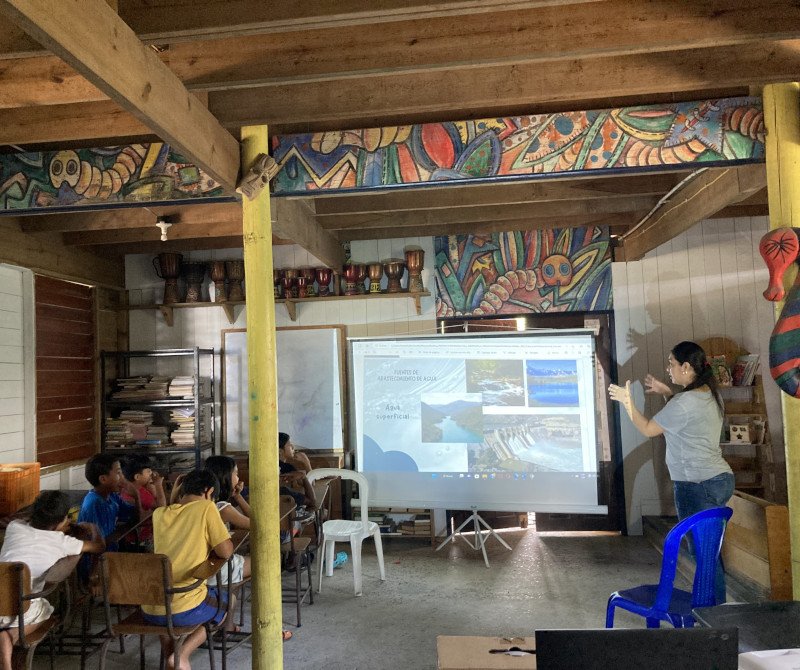
Photo: POLO
Honduras
Objective: To promote improvements in the management and conservation of the ACCMNM reef and the lower watershed of four of its influential rivers, with the involvement of stakeholders in the preparation of a plan that considers the results of water quality monitoring and its relationship with the state of the reef.
Project Progress:
- Two water quality monitoring surveys were conducted at the mouths of four rivers and seven reef sites of importance in the ACCMNM.
- According to the Coastal and Marine Water Quality Index Rating Scale (ICAM, in Spanish), the water quality at the seven reef sites was classified as “very poor” in five sites and “inadequate” in two sites for the month of November 2023.
- AGGRA monitoring was conducted at the seven reef sites, data is being analyzed and the results will be announced with the release of the Healthy Reef for Healthy People report card in 2024.
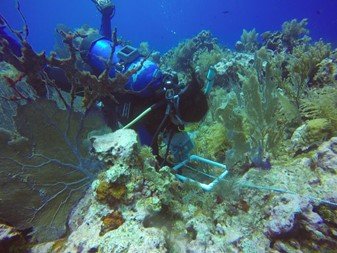
Photo: Fiama Molina
Honduras
Objective: By 2024, the integral management of the handling and final disposal of sludge generated as part of the wastewater treatment has been accomplished, thereby reducing factors affecting the effluent treatment process, allowing the reduction of operating costs and in turn promoting the integration of alternatives for the reuse of sludge which will reduce the sources of soil contamination in the marine national park.
Project Progress:
- To ensure suitable conditions for installing the dehydrator, improvements were made to the roof structure, a concrete slab was laid, and necessary adjustments were made to electrical and water piping.
- Two sludge samples were analyzed and found to have low levels of metals, complying with the Environmental Protection Agency (EPA) standards, but high levels of fecal coliform exceeding EPA standards.
- A virtual exchange was carried out with the Nicaraguan Water and Sewerage Company (ENACAL) and Zamorano Agricultural School aimed to share experiences and improve practices for sludge utilization and reuse, considering the sample results.
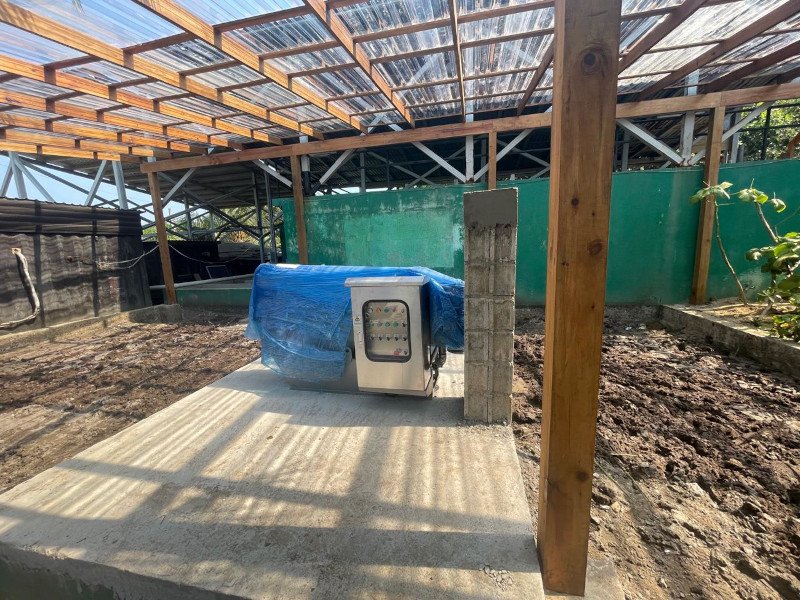
Photo: POLO
Honduras
Objective: To strengthen the management of drinking water and basic sanitation in the Crawfish Rock community.
Project Progress:
- Improvements were made to better manage and conserve water in CrawFish Rock, including automating the water pump, adapting the electrical installation, lighting the tank area, and cleaning the water tank.
- Fifty children and three teachers participated in educational sessions on basic sanitation.
- To date, 20 septic tanks have been cleaned at CrawFish Rock community.
Photo: BICA
Honduras
Objective: By 2026, improvement will have begun in the comprehensive management of the aquifer in the West End community through the implementation of a comprehensive approach that reduces the risks of damage to water supply sources underground.
Mexico
Objective: Strengthen the capacities of fishing cooperatives regarding comprehensive water management for product certification processes. Also, obtain a binding analysis of water quality and microplastics in Rainwater Harvesting Systems, Yalahau Lagoon, and coastal marine sites in three annual seasons (dry, rainy, and northerly winds).
Honduras
Objective: By 2026, key actors in the management of the protected area implement 3 participatory strategic lines to improve the health of the reefs of Cayos Cochinos and at least one river in the area of influence.
Photo: Gabriela Ochoa/Fundación Albatros
MAR+Invest is a blended finance mechanism with strong monitoring and evaluation of impacts, business acceleration and a capacity building program that aims to enable conditions for a sustainable ocean-based economy in the MAR. It will invest in market-based initiatives that make a positive contribution to the health and resilience of the coral reef ecosystems and communities of the Mesoamerican Reef.
Objective: To continue strengthening the leadership skills and networking opportunities of 21 leaders that are part of the Build & Connect 2023 cohort, by supporting a 4-day in-person graduation event, the development of a monitoring and evaluation system for the MAR Leadership program, and the development and implementation of a comprehensive fundraising plan for MAR Leadership that diversifies funding sources and increases annual revenue by 25% by the end of 2026.
Project Progress:
- Sureste Sostenible successfully developed the graduation event from March 12 to 15 in Puerto Morelos, Mexico. Eleven of the 21 leaders representing ten projects attended and strengthened their communication strategies and their networks through different work sessions.
The feedback received from the participants was positive and they emphasized the importance of designing projects at a regional level with multinational and multisectoral integration, as fundamental to strengthening enterprises and expanding the network of agents of change. The focus of the 2023 cohort on Business Canvas Design was also praised, as it addressed a current aspect of conservation: the need to create financial mechanisms for projects. - Zamia Media was hired to develop a comprehensive fundraising plan. So far, four meetings have been held and a fundraising strategy draft created.
- SSAC hired a consultant to develop their database and monitoring and evaluation system, as a result a draft has been created.
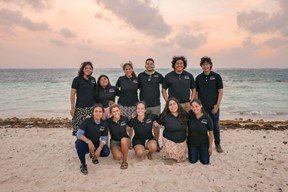
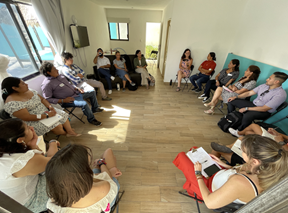
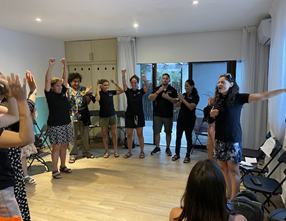
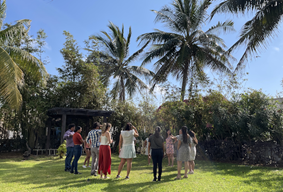
Photos: Sureste Sostenible
Objective: This project aims to contribute to improving the management of marine resources in the Marine Landscape territories and Guanaja, Bay Islands, and strengthen productive and commercial units by promoting better fishing practices and greater access to financial services.
Project Progress:
- The organization GOAL has provided 22 capacity building workshops on responsible fishing practices, proper handling and processing of fishery products, legal strengthening, business management, loss reduction and market access training. To date, there are a total of 493 beneficiaries (294 women and 223 men) through this project, including both fishing associations and artisanal fishers. To date, 22 business diagnoses of community fishing enterprises and 21 of tourism have been completed, which help identify areas of improvement of each venture.Additionally, GOAL coordinated nine meetings with various stakeholders, including government agents, fishing and tourism associations, and other organizations. Alliances were established and issues related to reef conservation and best practices were addressed.
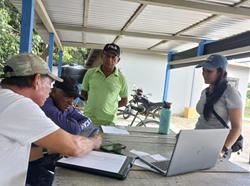
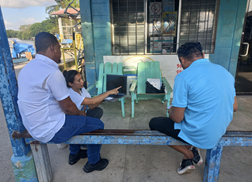

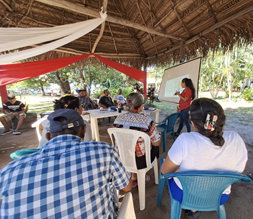
Photos: GOAL
Objective: Develop a business study to assess the seaweed mariculture industry in Belize, in collaboration with Future of Fish (FoF) and The Nature Conservancy Belize (TNC).
Project Progress:
- The business feasibility study was finalized and the finding is that at present, it is too early to allocate additional resources to this solution, as this industry requires several actions to be implemented first: implementing a regulatory framework, optimizing seaweed production techniques, and analyzing the value chain.
- MAR+Invest remains committed to collaborating with industry stakeholders to find solutions for issues related to the business model, regulation, and testing in other regions of the MAR.
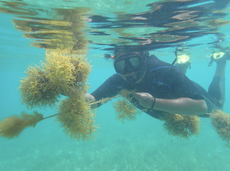
Photo: Jolie Pollard
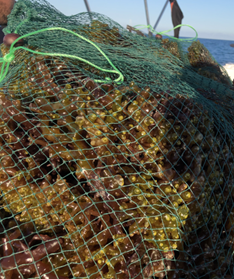
Photo: Maximiliano Caal
Photo: Fundación Albatros
The work carried out has been made possible by the support of our donors. We are grateful for their trust and continued generosity.
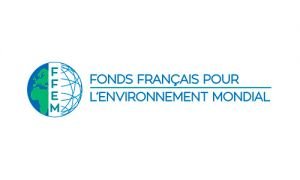
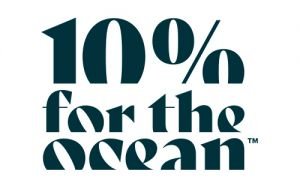
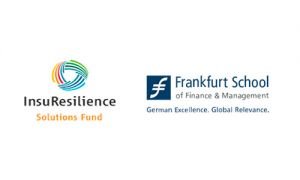
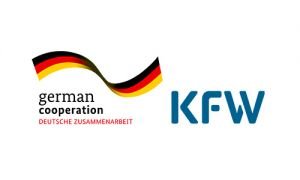


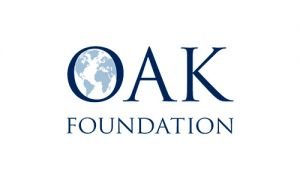

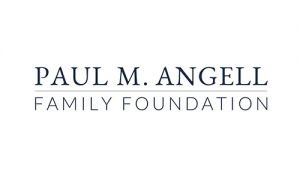
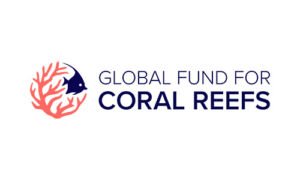

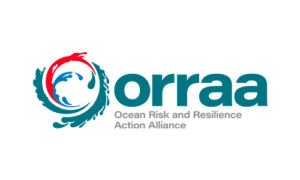
Photo: Gabriela Ochoa/Fundación Albatros
Followers on Facebook
Followers on Instagram
Followers on X
Views on YouTube
Followers on LinkedIn

Address:
22 avenida 0-59, Zona 15 Vista Hermosa II
Guatemala, C.A. 01015
Phone: +(502) 2369-3188
Phone: +(502) 2369-1978
Email: info@marfund.org
Website: https://marfund.org/

